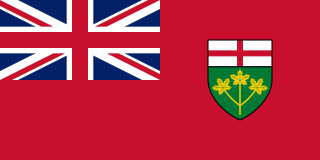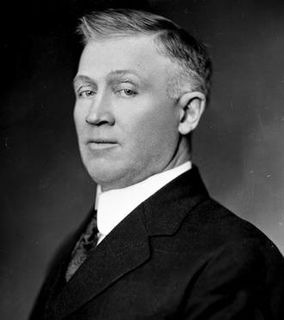Biography
Harry Evans was born on August 17, 1876, in Davenport, Ontario, now part of Toronto, the son of Rev. J. S. Evans and Mary Jane Evans (née Vaux). He was educated in Hamilton before earning a Bachelor of Arts from the University of Toronto in 1897. After graduating, he attended the Michigan School of Mines in Houghton, Michigan.

Ontario is one of the 13 provinces and territories of Canada and is located in east-central Canada. It is Canada's most populous province accounting for 38.3 percent of the country's population, and is the second-largest province in total area. Ontario is fourth-largest jurisdiction in total area when the territories of the Northwest Territories and Nunavut are included. It is home to the nation's capital city, Ottawa, and the nation's most populous city, Toronto, which is also Ontario's provincial capital.

Toronto is the provincial capital of Ontario and the most populous city in Canada, with a population of 2,731,571 in 2016. Current to 2016, the Toronto census metropolitan area (CMA), of which the majority is within the Greater Toronto Area (GTA), held a population of 5,928,040, making it Canada's most populous CMA. Toronto is the anchor of an urban agglomeration, known as the Golden Horseshoe in Southern Ontario, located on the northwestern shore of Lake Ontario. A global city, Toronto is a centre of business, finance, arts, and culture, and is recognized as one of the most multicultural and cosmopolitan cities in the world.

Hamilton is a port city in the Canadian province of Ontario. An industrialized city in the Golden Horseshoe at the west end of Lake Ontario, Hamilton has a population of 536,917, and a metropolitan population of 747,545. The city is located about 60 km southwest of Toronto, with which the Greater Toronto and Hamilton Area (GTHA) is formed.
He mined in Mexico for fifteen months before moving to Winnipeg where he was Business Manager for the Winnipeg Telegram (which had been founded by his brother William Sanford Evans, who would go on to become mayor of Winnipeg and leader of the Conservative Party of Manitoba) from 1900 until 1904. After leaving the telegram, he worked for the Manitoba Land & Investment Company for two years.

Mexico, officially the United Mexican States, is a country in the southern portion of North America. It is bordered to the north by the United States; to the south and west by the Pacific Ocean; to the southeast by Guatemala, Belize, and the Caribbean Sea; and to the east by the Gulf of Mexico. Covering almost 2,000,000 square kilometres (770,000 sq mi), the nation is the fifth largest country in the Americas by total area and the 13th largest independent state in the world. With an estimated population of over 120 million people, the country is the eleventh most populous state and the most populous Spanish-speaking state in the world, while being the second most populous nation in Latin America after Brazil. Mexico is a federation comprising 31 states and Mexico City, a special federal entity that is also the capital city and its most populous city. Other metropolises in the state include Guadalajara, Monterrey, Puebla, Toluca, Tijuana and León.

Winnipeg is the capital and largest city of the province of Manitoba in Canada. Centred on the confluence of the Red and Assiniboine rivers, it is near the longitudinal centre of North America, approximately 110 kilometres (70 mi) north of the Canada–United States border.
The Winnipeg Telegram was a daily newspaper in Winnipeg, Manitoba which was published from June 9, 1898 to October 16, 1920.
Evans moved to Alberta in 1906 to prospect coal seams on the Pembina River. He moved to Edmonton the following year and managed the Pembina Coal Co. until 1908. He was the Canadian manager of a financial house in London, England, until it went bankrupt in 1912, when he founded the H. M. E. Evans Company, Ltd., which dealt in bonds, insurance, and real estate. In 1910, he married Edith Isabel Gifford Jackson, with whom he would have one son and four daughters.

The Pembina River is a tributary of the Athabasca River in central Alberta, Canada.
He was elected mayor in the 1917 municipal election, finishing first in a five candidate field. He did not seek re-election at the expiration of his one-year term. Immediately before his term as mayor, he was president of the Edmonton Board of Trade.
In 1925, he was appointed chairman of the Alberta Coal Commission. He served as a financial advisor to the Government of Alberta from 1931 until 1937. He was admitted to the Order of the British Empire on July 2, 1946, for meritorious service in war work.

The Most Excellent Order of the British Empire is a British order of chivalry, rewarding contributions to the arts and sciences, work with charitable and welfare organisations, and public service outside the civil service. It was established on 4 June 1917 by King George V and comprises five classes across both civil and military divisions, the most senior two of which make the recipient either a knight if male or dame if female. There is also the related British Empire Medal, whose recipients are affiliated with, but not members of, the order.
Evans was involved with the Edmonton Rotary Club, the Manitoba Club, the Edmonton Board of Public Welfare, the Anglican Church, and the Conservative Party.
Harry Marshall Erskine Evans died in Edmonton September 20, 1973. Evansburg, Alberta, [1] which he founded, and Evansdale, Edmonton, a neighbourhood, are named in his honour.
Notably, Evans's brother William Sanford Evans served as mayor of Winnipeg and leader of the Manitoba Conservative Party, and his nephew Gurney Evans was Minister of Finance amongst other porfolios in Manitoba. Evans's daughter Sylvia Evans was amongst the few women who served in the Royal Canadian Air Force during World War II.




















